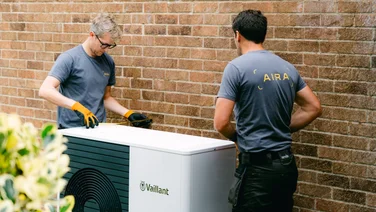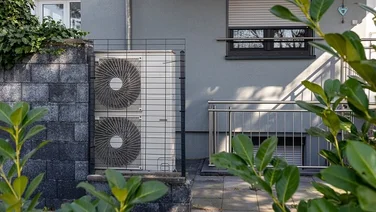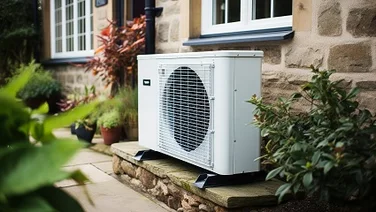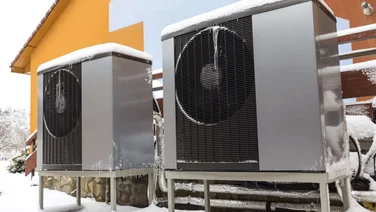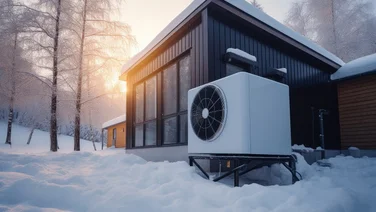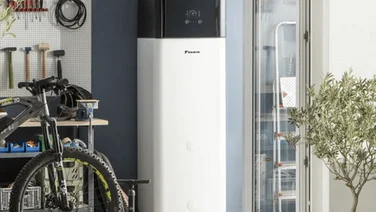We receive a small fee from trusted installers when you request a quote through our site. This helps us keep our content independent, well-researched and up to date – Learn more
- What is a heat pump water heater?
- How much does a heat pump water heater cost?
- Heat pump running costs
- Pros and cons of heat pump water heaters
- Does a heat pump water heater reduce your energy bills?
- How is a heat pump water heater installed?
- Are there any grants for heat pump water heaters?
- Does a heat pump water heater require any maintenance?
- Are heat pump water heaters worth it?
- Next steps
- FAQs
- Heat pump water heaters provide hot water, but not central heating
- They’re often used in homes with vented heating, such as in the US
- Heat pump water heaters cost between £1,400 and £4,100 on average
Heat pump water heaters are only designed to meet a home’s hot water needs, which explains why regular heat pumps cost more: they provide hot water for both radiators and bathrooms.
But not everyone uses radiators for heating, and if you just need to heat water for showers and taps, heat pump water heaters are a great investment.
We’ll go over what they are, how they work, and how much they cost in this article. We’ll also discuss the pros and cons, as well as the installation process.
Want a regular heat pump for central heating and hot water? If you fill in our quotes form, we can put you in touch with heat pump installers. They’ll reach out to you with their best prices.
What type of central heating do you currently use?
Get started
What is a heat pump water heater?
A heat pump water heater provides hot water for bathrooms by warming up the contents of a hot water cylinder or tank.
What sets it apart from other types of heat pumps is that it’s only designed to meet a household’s hot water needs, not its central heating needs.
For this reason, heat pump water heaters are most often used in homes that have what’s called a dry heat system, where heat is distributed in the form of hot air that’s pumped through vents or ducts in the house.
Homes that have a wet heat system – where hot water is distributed to radiators – don’t need a separate system for their hot water. They can use an air or ground source heat pump to fulfil both their heating and hot water needs.
How does a heat pump water heater work?
A heat pump water heater pulls warmth from the outside air, increases its temperature using electricity, and transfers it to water inside a cylinder or tank.
The heat pump water heater is connected to the outside via vents on an external wall. The unit itself is installed inside your home, and consists of two parts: the heat pump unit, and the water cylinder under it.
A fan installed inside the heat pump unit helps it pull in residual heat from the air outside. Its refrigerant and compressor system work to generate even more heat, which is transferred to the water via a coil inside the water cylinder.
How much does a heat pump water heater cost?
Size of household | Cylinder size | Hot water heat pump cost |
|---|---|---|
One-bedroom | 120 litres | £1,400-£2,000 |
Two-bedroom | 150 litres | £1,700-£2,500 |
Three-bedroom | 180 litres | £2,100-£3,000 |
Four-bedroom | 250 litres | £3,000-£4,100 |
Heat pump water heaters cost between £1,400 and £4,100 on average.
Price will vary depending on the size of the heat pump – that is, how many litres it can hold – as well as the brand, model, and installer.
The average three-bedroom home with one or two bathrooms needs a water tank of around 180 litres to meet its needs. A heat pump water heater of that size costs between £2,100 and £3,000.
Heat pump running costs
A ground source heat pump’s running costs for a three-bedroom household will typically come to around £939 per year.
The average air source heat pump will cost about the same, though this can vary significantly, depending on where you live in the UK.
| Heating method | Average monthly usage | Ofgem price cap 2025 | Standing charge | Monthly bill |
|---|---|---|---|---|
| Gas boiler | 960 kWh gas | 6.29p/kWh | 34.03p/day | £60.72 |
| Heat pump | 246 kWh electricity | 26.35p/kWh | 53.68p/day | £65.36 |
What type of central heating do you currently use?
Get started
Pros and cons of heat pump water heaters
- Low running costs
- Environmentally friendly
- Long lifespan
- Not very noisy
- High upfront costs
- Takes longer to heat water than other types of water heaters
- Not suitable for all homes
- Doesn’t provide central heating
Advantages of heat pump water heaters
Heat pump water heaters have relatively low running costs, especially when compared to their closest competitors, electric water heaters. They’re 300% efficient on average, meaning they generate three units of heat for every one unit of energy they consume.
By contrast, electric water heaters are 100% efficient. Essentially you’ll be using three times less electricity to heat hot water with a heat pump water heater.
This is also what makes heat pump water heaters environmentally friendly. Not only do they use electricity instead of gas, they don’t use a lot of it. Since not all electricity comes from renewable sources, the less you use, the lower your carbon footprint is.
Heat pump water heaters also last longer than electric or gas water heaters. They can last up to 15 years, while their counterparts last 10-12 years on average.
Lastly, heat pump water heaters are very quiet machines. They produce noise at similar levels to a fridge. Plus, unlike electric or gas water heaters, heat pump water heaters’ noise levels don’t increase by much when the machine starts up.
Disadvantages of heat pump water heaters
The main disadvantage of heat pump water heaters is they’re expensive. They cost around £1,000 more than gas and electric water heaters.
They also take a little longer to heat water than traditional water heaters. This is because they produce heat at lower temperatures than gas or electric heaters, averaging 45°C instead of 60°C.
Heat pump water heaters also aren’t suitable for all homes. They need to be installed next to an external wall, to allow for venting.
Depending on the layout of your home, this could mean the heat pump being installed in an inconvenient spot, such as your living room.
Lastly, heat pump water heaters are just that: water heaters. They aren’t designed to provide central heating for your home along with hot water for your bathrooms, the way boilers or regular heat pumps are.
This means if you want to decarbonise your heating along with your hot water, you’ll need to get a separate air-to-air heat pump.
Does a heat pump water heater reduce your energy bills?
A heat pump water heater can reduce your energy bills if you’re switching to one from an electric water heater.
Using a heat pump water heater costs £139 a year to run for the average UK household, compared to £418 a year with an electric water heater.
Why is it so much cheaper? Well, heat pump water heaters are three times more efficient than electric heaters, so they use three times less electricity.
On the flip side, if you’re switching from a gas water heater to a heat pump water heater, your running cost will go up slightly, since electricity costs around four times more than gas.
Luckily, thanks to the heat pump’s high efficiency, the difference in running costs isn’t that great. You’ll only spend around £31 more a year on water heating if you switch from a gas water heater to a heat pump water heater.
How is a heat pump water heater installed?
Heat pump water heaters are installed inside your home, but they need to be connected to the outside through two vents or ducts. One serves as an exhaust, the other as an air supply vent.
To do this, the installer will have to drill through an external wall to create space for the vents.
The heat pump water heater is then placed inside, next to the external wall, and connected to your home’s electrical and water mains.
The heat pump water unit has a cold water inlet, where cold water from the main supply is fed into the unit, and a hot water outlet, from which hot water is fed to your home’s bathrooms.
If you’re replacing a different water heater, these water inlet and outlet pipes should already be in place, since they would have been used by your previous water heater.
Are there any grants for heat pump water heaters?
There aren’t any grants currently available for heat pump water heaters.
Grants such as the Boiler Upgrade Scheme are only available for technology that provides both heating and hot water. Heat pump water heaters, unfortunately, only do the latter.
It’s possible that the ECO4 scheme could, in the future, be used to partially fund installations of heat pump water heaters in social housing.
However the new phase of ECO4, that includes grants for social housing, has not yet come into effect.
Does a heat pump water heater require any maintenance?
Heat pump water heaters don’t require much maintenance.
Most manufacturers recommend you get your heat pump water heater serviced once a year, mainly to make sure that everything is still operating correctly.
It’s worth doing this, since failing to get annual checks could void your heater’s warranty, which would be a bother in the unlikely event you have an issue.
Potential problems include leakage or a loss of refrigerant, but they’re very rare. If you notice a problem, such as the water not being hot enough, it’s always best to contact a technician rather than fiddling with the heat pump yourself.
Are heat pump water heaters worth it?
Heat pump water heaters might be worth it if your house has a vented heating system and you need a separate device for your hot water.
They’re cheaper to run than electric water heaters, and they’re much more environmentally friendly than gas water heaters. If both those things matter to you, heat pump water heaters are a good choice.
However, if your home uses a wet heat system – that is, radiators or underfloor heating – and you’re looking to replace your gas boiler, then heat pump water heaters aren’t a good option.
You’ll be better off switching to an air source or ground source heat pump. These can provide your home with both heating and hot water.
Next steps
Heat pump water heaters are a low-carbon way for households to fulfil their hot water needs.
They’re a more environmentally friendly, longer-lasting alternative to traditional water heaters, and they cost less to run than electric water heaters.
If you’d like a heat pump that can meet both your heating and hot water needs, we can help. Just fill in our quick form, and we’ll pass your details onto expert installers. They’ll reach out to you with quotes.
FAQs
Can a heat pump water heater replace a boiler?
A heat pump water heater can’t entirely replace a boiler.
Boilers are designed to heat water for radiators – as a form of central heating – and for bathrooms. Heat pump water heaters, on the other hand, are only designed to provide hot water for bathrooms.
Do you need a water tank with a heat pump?
Yes, you need to have a water tank or water cylinder when heating your home with a heat pump. Heat pumps are capable of heating water to be used in bathrooms and radiators, but you need somewhere to store the hot water that’s meant for bathrooms.
How long does it take for a heat pump water heater to heat water?
It takes between one and two hours for a heat pump water heater to heat water, assuming the water has cooled in the tank.
That’s slightly longer than it takes gas or electric water heaters, which can do the job in 30 minutes to an hour.


